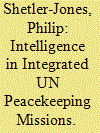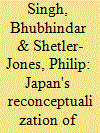| Srl | Item |
| 1 |
ID:
083195


|
|
|
|
|
| Publication |
2008.
|
| Summary/Abstract |
New understandings of operational and security challenges in multidimensional missions have provided the momentum to overcome resistance to the establishment of an intelligence capacity in UN field missions. Joint Mission Analysis Centres (JMACs) have been set up in several missions and are beginning to fulfil this function, both with respect to security aspects of operations and (to a lesser extent) in support of integrated management. However, the contribution JMACs could make to integration is not being fully realized. This is partly a result of the choice to focus expectations for integration at the level of the head of mission, while neglecting to give institutions at a higher level the backing they need to effectively harmonize the priorities and impulses of the Security Council and other parts of the organization. This has led to a perception of integration as a technology of subordination that favours a security agenda over other goals of the UN system. Consequently, the JMAC has been unable to gain the trust and commitment it needs to fully realize its potential to support the strategic management of integrated missions
|
|
|
|
|
|
|
|
|
|
|
|
|
|
|
|
| 2 |
ID:
106466


|
|
|
|
|
| Publication |
2011.
|
| Summary/Abstract |
Japan has steadily extended its military reach from a domestic zone of defense against territorial invasion in the late 1950s, through regional security policy in the late 1970s to what has now become a globally scaled military role. This re-expansion is perceived by some as evidence of revived militaristic ambitions, and by others as subservience to the US global strategy. However, taking the cue from Japan's 2004 National Defence Programme Guideline (New Taiko), this paper assesses the role globalization has played in this territorial expansion. The impact of globalization is evident in the double expansion of Japan's national security conception in geographical terms and self-defense forces roles in global security. These 'expansions' are studied through two key elements of globalization - the deterritorialization of complex relations of interdependence between states (security globality) and the inter-penetrating nature of these relations blur the boundary between foreign and domestic spaces (intermestic space).
|
|
|
|
|
|
|
|
|
|
|
|
|
|
|
|
| 3 |
ID:
189744


|
|
|
|
|
| Summary/Abstract |
The UK’s relationship with Japan is the cornerstone of the Indo-Pacific ‘tilt’ and provides unique insights into its motivating logic and the UK’s role in world politics, Philip Shetler-Jones argues. First, it exhibits the importance the UK gives to universal principles unrestricted by cultural or geographic markers in its choice of ‘like-minded’ partners – an aspect of Global Britain that is reciprocated in Japanese policy, informing how the ‘tilt’ is received in the region. Second, it represents the prime example of how the tilt maintains the equilibrium of UK foreign policy in the midst of a shifting global power balance, by means of a more diversified, flatter framework of ‘quasi alliance’ relations built on the foundation of the transatlantic alliance. Third, the foremost commitment in the Integrated Review that the UK remain a leading technology power is reflected in the defence technology and industry partnership that is becoming central to the UK–Japan relationship.
|
|
|
|
|
|
|
|
|
|
|
|
|
|
|
|